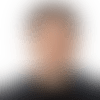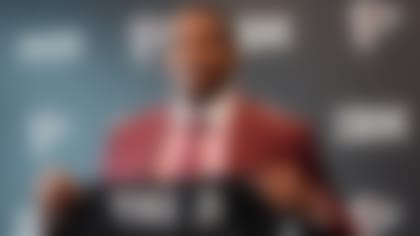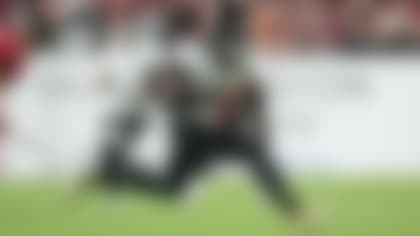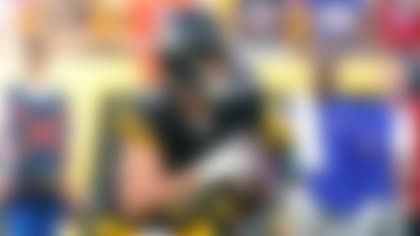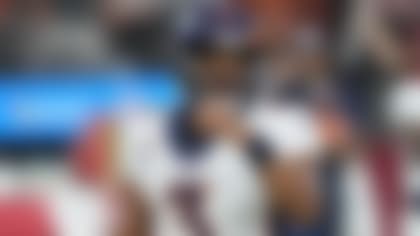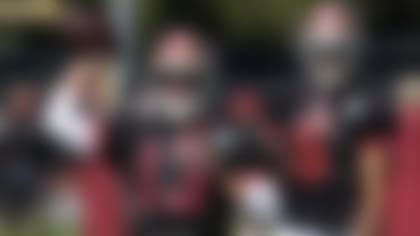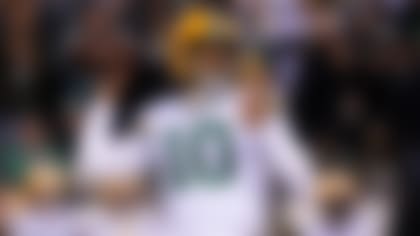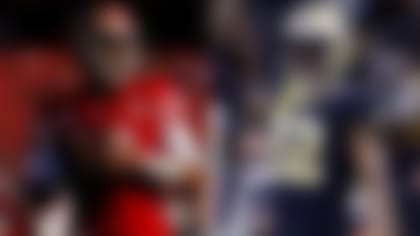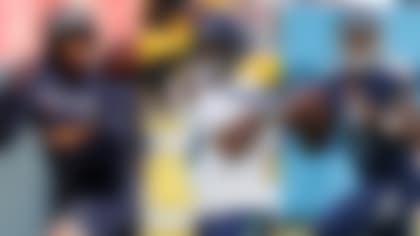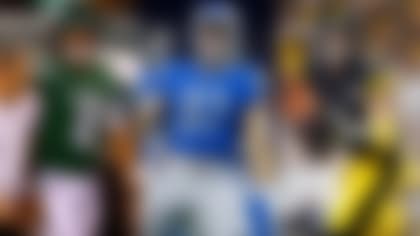The Rams and Bears both finished Monday Night Football with 5-2 records, but not all 5-2 records are created equal. The Rams have the look of a January team that matters with the most efficient rushing attack in football, a creative play-caller, two defensive game-changers and the immortal Johnny Hekker. The Bears have a strong defense -- for 2020 -- and an offense out of 1977.
Chicago's defense out-scored its offense Monday night in their desultory 24-10 loss in Los Angeles, a reminder that the Bears are overmatched whether Nick Foles or Mitchell Trubisky is at quarterback. Starting running back David Montgomery struggles to break tackles and doesn't have a lot of juice. The receiving weapons fall off a cliff after poor Allen Robinson, who seems to be crushed after every Foles moon ball. The offensive line has declined from a year ago, struggling to open up holes in the running game or protect Foles for long. And Foles knows it. ESPN's Brian Griese said during the broadcast that Foles told the ESPN crew that sometimes Bears coach Matt Nagy calls in a play that Foles knows won’t work because he won't have enough time in the pocket. That's both damning and clearly true for anyone who watched Foles try to create plays under duress on Monday night. (When asked about Griese's comments after the game, Foles said they were the result of a miscommunication between him and Griese.)
The Bears' defense is good enough to keep them in games, but I don't trust defense-led teams in this era because even the best defenses (Tampa, Chicago, Baltimore, Pittsburgh) can give up 30 points in any given week. Those are just the rules of the game in 2020 and it's hard to imagine the Bears' offensive talent playing well by those rules in January, if they even get there.
In this week's Debrief, I'm taking a look at how each NFC team with a winning record needs to improve:
1) Seattle Seahawks (5-1)
MUST IMPROVE: The pass rush. The Week 6 bye did not fix the Seahawks' defense. Pete Carroll is such a good defensive coach, with so many quality players at linebacker and in the secondary, that I had this notion Carroll would make a few tweaks and sprinkle some motivational-slogan dust in the locker room, and they'd suddenly turn respectable. Fifty Kyler Murray dropbacks later (with Seattle logging zero QB hits, no sacks and just one pass defensed on Sunday Night Football), that hope feels naive.
The eventual return of QB-hunting safety Jamal Adams will help, but the Seahawks' lack of defensive playmakers stood out in their 37-34 overtime loss to the Cardinals, especially up front. The team's two leaders in pressures this season, according to Pro Football Focus, are journeymen Benson Mayowa and Damontre Moore. General manager John Schneider has a history of being active on the trade market, and it wouldn't be surprising if the Seahawks looked for pass rush help in the coming days, with players like Carlos Dunlap, Geno Atkins and Takk McKinley possibly available.
2) Green Bay Packers (5-1)
MUST IMPROVE: Inside linebacker play. As team weaknesses go, struggling in run defense, especially at the linebacker level, isn't the worst. Packers defensive coordinator Mike Pettine has built a career off this approach, though it did blow up spectacularly in last year's NFC Championship Game.
Green Bay's run defense hasn't dramatically improved this season, but the team's Week 7 win over the Texans provides some hope. In his career debut, fifth-round pick Kamal Martin led the linebacker position in snaps and flashed with six solo tackles. The next two leaders in snaps at the position were a 2019 seventh-rounder (Ty Summers) and undrafted rookie Krys Barnes. The biggest source of help for this group would be a return to 2019 form by defensive end Preston Smith and nose tackle Kenny Clark. In an NFC playoff field that could include the 49ers again and strong rushing teams like the Rams, Bucs and Cardinals, the Packers have to be worried about not getting off the field when it matters most.
3) Tampa Bay Buccaneers (5-2)
MUST IMPROVE: Nothing. They are perfect. Kidding! But after writing about their Super Bowl prospects last week and watching them on Sunday, I believe they are the NFL's most complete team. They are already making weekly strides in their biggest area of possible improvement, passing-game efficiency. It's hard to overstate how important receiver Chris Godwin's health is to this offense, and there is no denying now that tight end Rob Gronkowski looks better in late October than he did throughout September. Tom Brady is supported by a top-five offensive line, a top-six rushing game in DVOA and a top-five defense.
How Antonio Brown fits into this mix remains to be seen, but the surplus of weapons in Tampa is pretty obvious. They don't need Mike Evans or Scotty Miller to make big plays in any given week. They don't need running back Leonard Fournette to be better than average. Their best games offensively have come against struggling or injured defenses like the Chargers, Packers and Raiders, so it's worth wondering what will happen if they have to square off with a top defense in the playoffs. Then again, other than the Bears, the best defense Brady might face in the NFC is the one he sees in practice every day.
4) Arizona Cardinals (5-2)
MUST IMPROVE: Passing-game consistency. If the Cardinals want to graduate from frisky problem opponent to true contender, Sunday night's overtime win against the Seahawks was a great start. The offense flows more smoothly when running back Chase Edmonds gets a lot of snaps. Larry Fitzgerald had his best game of the season, and Christian Kirk was key in the red zone. Still, Arizona needs more diversity and consistency from an offense that has been hot and cold for stretches, often relying too much on Kyler Murray scrambling.
Calling the passing game the team's biggest area of need is unfair to Murray, because too much is expected of the second-year quarterback. But it's a realistic assessment of what the Cardinals need to improve on to capitalize on their 5-2 start. Defensive coordinator Vance Joseph can cook up some wild pressures, and there are some playmakers on defense (Budda Baker! Haason Reddick, suddenly! Patrick Peterson, coming off his best game of the season!), but the unit as a whole is, at its best, hoping to be middle-of-the-pack.
Simply finishing with a record over .500 for the first time since the team's 2015 NFC Championship Game appearance would be a major step forward for this squad. To be dangerous in January, however, Arizona needs the passing game to look more like it did Sunday night and less like it did in the first six weeks of the season.
5) New Orleans Saints (4-2)
MUST IMPROVE: The secondary. What's old is new again. The Saints' incredibly deep group on paper hasn't gelled on the field. Coordinator Dennis Allen's trademark miscommunications are back, appearing often when the team sends a pressure that appears too complicated for its own good. PFF has the Saints ranked 28th in coverage stats, with Marshon Lattimore's struggles surprising the most. Safety Marcus Williams' blown coverage on a Teddy Bridgewater 74-yard touchdown to D.J. Moore is becoming too typical of this season.
Asked Monday why there have been so many coverage busts, Sean Payton said, "That's the $6 million question right now."
Malcolm Jenkins (32) is showing his age for the first time in his career, while upstart C.J. Gardner-Johnson's high-risk style has created big plays for both sides. The combination of an erratic secondary and Drew Brees attempting the lowest percentage of deep passes in the league (per PFF) gives the Saints a razor-thin margin for error. Even in a game like in Sunday's win over the Panthers, where the Saints mostly controlled the action, they are susceptible to sweating out the final outcome.
The Saints have so many veterans, including some who don't always play (D.J. Swearinger! P.J. Williams! Patrick Robinson!), that a shakeup here wouldn't be a surprise.
6) San Francisco 49ers (4-3)
MUST IMPROVE: Their health. Jimmy Garoppolo had the second-lowest average depth of target on Sunday among starting QBs -- and the most yards per attempt. If the last two weeks haven't convinced you that 49ers coach Kyle Shanahan is the best play caller in football (sorry, Andy and Eric in K.C!), then I have no use for you.
The 49ers' schedule stays brutal moving forward, but they've proven they can stay afloat in the playoff race while waiting to get healthy. Deebo Samuel and running back Jeff Wilson were the latest casualties in the team's destruction of the Patriots on Sunday, but the defensive injuries are a bigger concern. Their starting safeties (Jaquiski Tartt and Jimmie Ward) aren't believed to have long-term injuries. Key pieces Dee Ford, K'Waun Williams, Richard Sherman and Kwon Alexander should be back ... eventually.
It's unrealistic to expect all of the injured 49ers to return at a high level, but no team is poised to add more talent to the field in November and December than San Francisco, provided the injury luck turns around. If the Niners can somehow make it to the playoffs, they're in line to shape up as the proverbial team no one wants to face -- as opposed to the eventual NFC East champion, the proverbial team everyone will want to face.
7) Los Angeles Rams (5-2)
MUST IMPROVE: Shot plays. Monday night's performance against a sound Bears defense was typical of the Rams' offense this season. They rushed for 161 yards and Jared Goff's numbers were solid (23 of 33 for 219 yards and 2 TDs) but not spectacular. He throws a beautiful ball when protected, but also was lucky that the Bears didn't recover his fumble or pick off a few possible interceptions. When Goff had a chance to make a big play down the field, he couldn't connect.
This feels like a small nit to pick, but Goff doesn't rank in the top 20 in yards gained off throws of 20 yards or more, per PFF. This is partly by design because he doesn't attempt that many deep passes, but the Rams consistently have to work awfully hard to score. While Goff is making more off-platform throws than previous years, he still doesn't have the mobility to create many plays out of structure. The lack of big plays is why the Rams offense ranks high in efficiency metrics -- they move the ball -- but below average in points scored. It's a high-class problem, but in a league with some truly great passing attacks, the Rams are at risk of just being good enough.
